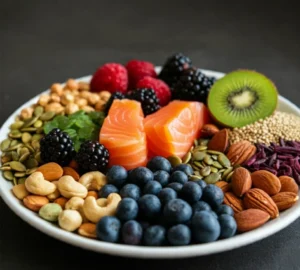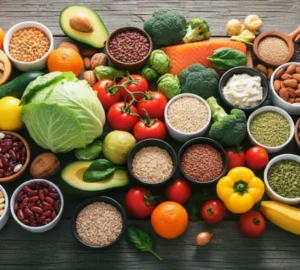Tired of Bloating, Indigestion, and Tummy Troubles Stealing Your Joy?

We’ve all experienced that uncomfortable feeling of being bloated, gassy, or just plain “off” after a meal. Digestive woes can quickly put a damper on your day, leaving you feeling sluggish, irritable, and unable to enjoy life’s simple pleasures. But what if nature held the key to soothing your gut and restoring digestive harmony?
- Herbal Remedies: Your Gut’s Best Friend
- Why Choose Herbal Remedies for Digestion?
- Understanding Digestive Health: The Gut-Brain Connection and Beyond
- Top Herbal Remedies for Digestive Health: Nature’s Arsenal for Tummy Troubles
- How to Use Herbal Remedies for Digestive Health: Your Guide to a Happier Tummy
- Lifestyle Tips for Optimal Digestive Health: Nourish Your Gut from the Inside Out
- Stress Management: Chill Out for a Happy Gut
- Conclusion: Unlock a Healthier, Happier Gut with Nature’s Wisdom
Herbal Remedies: Your Gut’s Best Friend
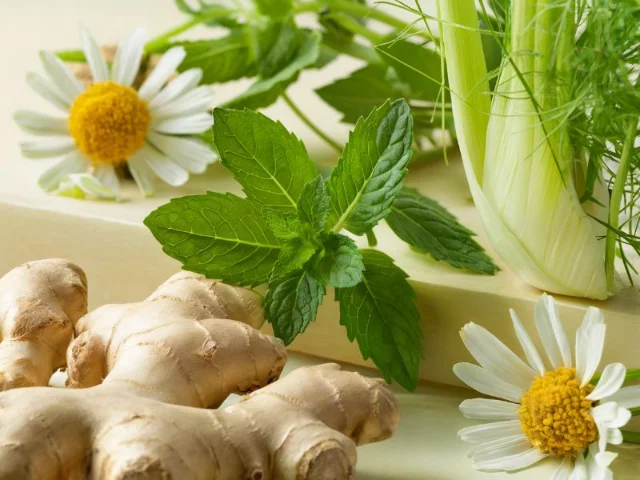
Enter the world of herbal remedies – a treasure trove of natural solutions for common digestive problems. These gentle yet powerful plants have been used for centuries to soothe upset stomachs, reduce inflammation, improve digestion, and restore gut health.
Discover Nature’s Digestive Powerhouse
In this comprehensive guide, we’ll uncover:
- The science behind how herbal remedies work their magic on your gut.
- The top herbs for relieving common digestive complaints like bloating, indigestion, and constipation.
- How to incorporate these natural healers into your daily routine for optimal digestive health.
- Lifestyle tips to complement your herbal remedies and support your gut’s well-being.
Why Choose Herbal Remedies for Digestion?
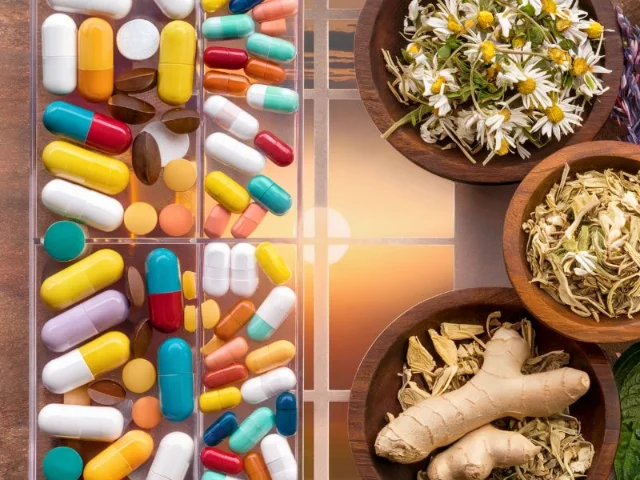
Unlike over-the-counter antacids, which often provide temporary relief and may come with unwanted side effects, herbal remedies offer a gentler and more holistic approach to digestive health. They work in harmony with your body, addressing the root cause of the problem rather than just masking the symptoms.
A Happier Gut, a Happier You
A healthy gut is the foundation for overall health and well-being. When your digestion is functioning optimally, you not only feel better physically, but you also experience improved mood, energy levels, and even a stronger immune system.
Ready to unlock the secrets of herbal remedies and revitalize your digestive health? Let’s dive in and discover how these natural wonders can transform your gut and your life.
Understanding Digestive Health: The Gut-Brain Connection and Beyond
Before we delve into the power of herbal remedies, let’s take a closer look at your digestive system – an intricate network of organs working tirelessly to break down food, absorb nutrients, and eliminate waste. Think of it as your body’s own personal food processing plant. When it’s running smoothly, you feel energized, vibrant, and ready to conquer the world. But when things go awry, the effects can ripple through your entire being, impacting not only your physical health but also your mood and energy levels.
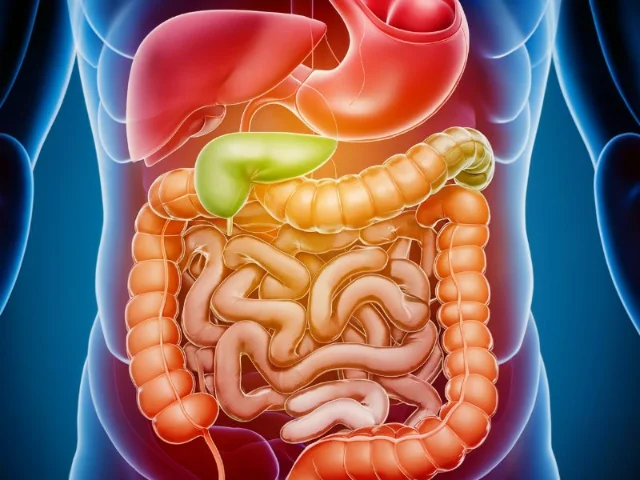
The Digestive System: A Journey From Mouth to…Well, You Know
Your digestive journey begins in your mouth, where enzymes in your saliva start breaking down carbohydrates. From there, food travels down your esophagus to your stomach, where it’s churned and mixed with digestive juices.
Next stop, the small intestine, where most nutrient absorption takes place. The remaining waste then moves on to the large intestine, where water is absorbed, and stool is formed. Finally, waste products are eliminated through the rectum and anus.
It’s a complex process, but when everything is working in harmony, you hardly notice it happening. However, when any part of this system gets thrown off balance, you’ll definitely feel it.
Common Digestive Issues: The Unpleasant Side of Digestion
Unfortunately, digestive problems are all too common. Many of us experience occasional bloating, gas, constipation, or diarrhea. For some, these issues are chronic and can significantly impact their quality of life.
Here’s a quick rundown of some common culprits:
- Indigestion: That burning sensation or discomfort in your upper abdomen, often accompanied by bloating and gas.
- Bloating: The feeling of fullness and tightness in your abdomen, often caused by gas or fluid retention.
- Constipation: Difficulty passing stools, often due to a lack of fiber or fluids in your diet.
- Diarrhea: Loose, watery stools that can be caused by a variety of factors, including infection, food intolerance, or stress.
- Irritable bowel syndrome (IBS): A chronic condition characterized by abdominal pain, bloating, gas, and changes in bowel habits.
- Inflammatory bowel disease (IBD): A group of chronic inflammatory conditions affecting the digestive tract, including Crohn’s disease and ulcerative colitis.

If you’re experiencing any of these symptoms, it’s important to consult with your doctor to rule out any underlying medical conditions.
The Gut Microbiome: Your Inner Ecosystem
Did you know that you have trillions of microorganisms living in your gut? These bacteria, fungi, viruses, and other microbes collectively make up your gut microbiome, and they play a crucial role in your overall health.

Your gut microbiome is involved in a wide range of functions, including:
- Digestion: Gut bacteria help break down food, synthesize vitamins, and extract nutrients.
- Immunity: A healthy gut microbiome supports a strong immune system and helps protect against infection.
- Mental health: There’s growing evidence of a strong link between gut health and mental health, with research suggesting that an imbalance in gut bacteria may contribute to anxiety, depression, and other mood disorders.
Keeping your gut microbiome healthy is essential for optimal digestion and overall well-being. Factors like diet, stress, medication use, and even sleep can all impact your gut microbiome.
By understanding the intricate workings of your digestive system and the crucial role of your gut microbiome, you can take proactive steps to support your digestive health and nourish your entire body.
Top Herbal Remedies for Digestive Health: Nature’s Arsenal for Tummy Troubles
Ready to equip your kitchen with nature’s finest digestive aids? Look no further than these time-tested herbs, each boasting a unique set of superpowers to soothe, heal, and restore balance to your gut.
Ginger: The Spicy Gut Soother
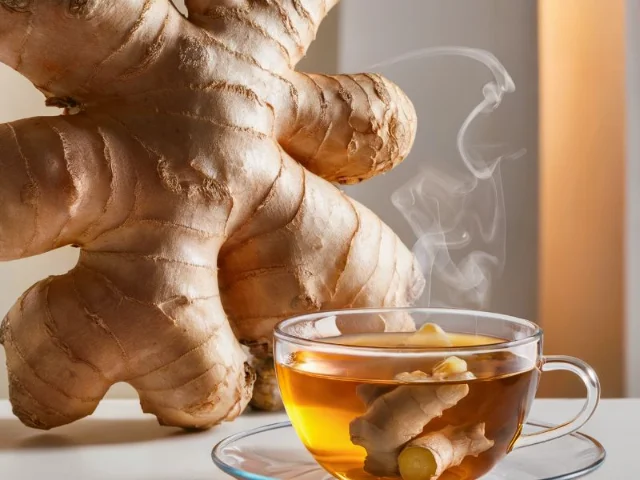
Ginger, that fiery spice you might add to stir-fries or curries, is much more than just a flavor enhancer. It’s a digestive superstar, packed with compounds like gingerol that boast anti-inflammatory and gut-healing properties.
- Nausea Relief: Ginger has long been used to calm upset stomachs and quell nausea, making it a popular remedy for morning sickness, motion sickness, and even chemotherapy-induced nausea.
- Anti-Inflammatory Power: The anti-inflammatory properties of ginger can help reduce inflammation in the gut, which is often at the root of many digestive issues like bloating, gas, and indigestion.
- Digestive Aid: Ginger can stimulate digestive enzymes and promote the movement of food through your digestive tract, easing indigestion and constipation.
You can enjoy ginger in various forms for digestive health: as a tea, in capsules, or even as a tasty ginger chew.
Peppermint: The Cool and Calming Gut Ally

Peppermint, with its refreshing aroma and cooling sensation, is a welcome relief for a troubled tummy. This versatile herb has been used for centuries to soothe digestive discomfort and promote gut health.
- IBS Relief: Studies have shown that peppermint oil can effectively reduce symptoms of irritable bowel syndrome (IBS), such as abdominal pain, bloating, and gas. It does this by relaxing the muscles in the digestive tract and reducing spasms.
- Soothes Indigestion: Peppermint can help ease indigestion and heartburn by reducing stomach acid production and promoting the flow of bile, a digestive fluid that helps break down fats.
- Freshens Breath: Peppermint’s antibacterial properties can help freshen breath and combat bad bacteria in the mouth.
Enjoy peppermint as a tea, take enteric-coated capsules (which release the oil in the intestines rather than the stomach), or inhale peppermint oil for aromatherapy benefits.
Fennel: The Gas and Bloating Buster
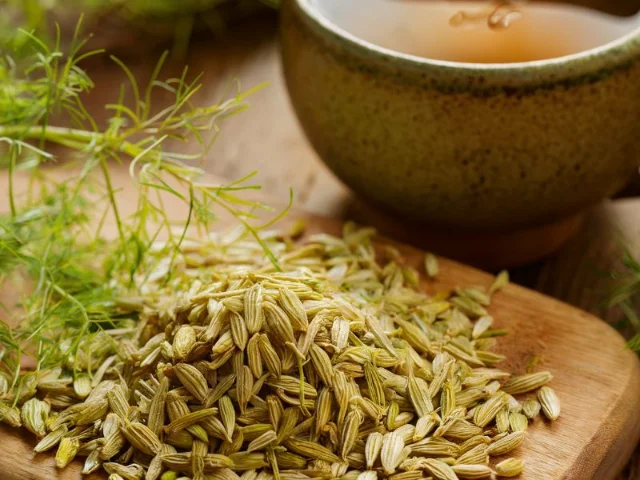
Fennel, with its licorice-like flavor, is a carminative herb, meaning it helps to expel gas from the digestive system. It’s a natural remedy for bloating, gas, and indigestion.
- Reduces Gas and Bloating: Fennel contains compounds that relax the muscles in the digestive tract, helping to reduce gas and bloating.
- Soothes Colic: Fennel has been traditionally used to relieve colic in infants and may also help soothe digestive discomfort in adults.
- Other Benefits: Fennel also has anti-inflammatory and antimicrobial properties, which may contribute to its digestive benefits.
You can chew on fennel seeds after a meal, steep them in hot water for a calming tea, or even incorporate them into your cooking for added flavor and digestive support.
Chamomile: The Gentle Healer

Chamomile, a delicate daisy-like flower, is renowned for its soothing and calming properties. It’s a gentle yet effective remedy for various digestive complaints.
- Anti-Inflammatory: Chamomile contains compounds like chamazulene and bisabolol, which have anti-inflammatory properties that can help soothe an irritated gut lining.
- Relieves Indigestion and Upset Stomach: Chamomile tea can help reduce stomach acid and ease indigestion, heartburn, and nausea.
- Stress Reduction: Chamomile’s calming effects can also help reduce stress, which is often a trigger for digestive problems.
Enjoy chamomile as a tea before bed or after meals, or take chamomile capsules for a more concentrated dose.
These are just a few of the many herbal allies available to support your digestive health. By incorporating these natural remedies into your routine, you can soothe your gut, improve digestion, and enhance your overall well-being.
How to Use Herbal Remedies for Digestive Health: Your Guide to a Happier Tummy
Now that you’ve met some of nature’s most effective digestive allies, it’s time to learn how to harness their power for your own gut health. The good news is that incorporating herbal remedies into your routine is easy and enjoyable, with various forms and methods to suit your preferences. Let’s explore the different ways you can use these natural healers to soothe your stomach, improve digestion, and enhance your overall well-being.
Herbal Teas: A Soothing Ritual for Digestive Harmony
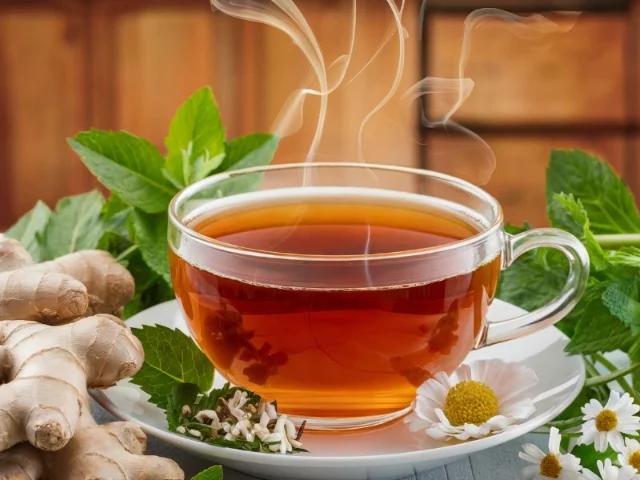
Herbal teas are a time-honored tradition for promoting digestive health. Not only are they delicious and hydrating, but they also offer a ritualistic experience that can help you relax and unwind, further supporting your digestion.
To brew a soothing digestive tea, simply steep 1-2 teaspoons of dried herbs in a cup of hot water for 5-10 minutes. Popular choices for digestive health include ginger, peppermint, chamomile, and fennel. You can enjoy them individually or create your own custom blends to target specific concerns.
For optimal results, sip your tea slowly and mindfully, savoring the flavors and aromas. Aim to drink it after meals or whenever you experience digestive discomfort. You can also enjoy a cup of herbal tea before bed to promote relaxation and prepare your body for restful sleep.
Capsules and Tablets: Convenient and Consistent Dosing

If you’re looking for a convenient and standardized way to consume herbal remedies, capsules and tablets are a great option. They offer pre-measured doses of specific herbs, making it easy to incorporate them into your daily routine.
When choosing herbal supplements, opt for reputable brands that adhere to good manufacturing practices (GMP) and have been third-party tested for quality and purity. Always follow the recommended dosage on the product label, and consult with your healthcare provider if you have any concerns or are taking medications.
Remember, starting with a lower dose and gradually increasing it as needed is often a wise approach, especially if you’re new to herbal remedies. This allows your body to adjust and minimizes the risk of any adverse reactions.
Essential Oils: Aromatic Aid for Digestive Relief

Essential oils are potent plant extracts that offer a concentrated dose of therapeutic benefits. While most essential oils are not meant for ingestion, some, like peppermint oil, can be used topically to alleviate digestive discomfort.
Peppermint oil, when diluted with a carrier oil like coconut oil or jojoba oil, can be applied to the abdomen to relieve gas, bloating, and cramps. Its cooling and soothing properties can help relax the muscles in your digestive tract and promote smoother digestion.
Important Note: Always dilute essential oils before applying them to your skin, and perform a patch test on a small area to check for sensitivity. Pregnant or breastfeeding women should consult with their healthcare provider before using essential oils.
Other Applications: Embrace the Versatility of Herbs
The beauty of herbal remedies is their versatility. You can incorporate them into your diet in various creative ways:
- Ginger: Add freshly grated ginger to stir-fries, soups, or smoothies for a warming and digestive boost. You can also try ginger chews or candies for on-the-go relief.
- Peppermint: Steep fresh peppermint leaves in hot water for a refreshing tea or add them to salads and other dishes for a burst of flavor.
- Fennel: Chew on fennel seeds after meals to aid digestion or use them in cooking to add a subtle licorice flavor to soups, stews, and baked goods.
- Chamomile: Incorporate chamomile flowers into desserts or baked goods for a subtle floral flavor and calming effect.
By experimenting with different applications of herbal remedies, you can find enjoyable ways to integrate them into your lifestyle and reap their digestive benefits.
Lifestyle Tips for Optimal Digestive Health: Nourish Your Gut from the Inside Out
Herbal remedies can work wonders for your gut, but they’re not the only players in the game. Your daily habits and lifestyle choices significantly impact your digestive health. Think of it as a team effort: herbal remedies can provide targeted support, but a healthy lifestyle sets the stage for optimal digestion and overall well-being. Let’s explore some key lifestyle tips to nurture your gut and keep your digestive system humming along smoothly.

Diet: Fuel Your Gut with Fiber and Whole Foods
Your diet is the cornerstone of digestive health. What you eat directly impacts the balance of bacteria in your gut, the efficiency of your digestion, and your overall well-being. So, what should you be putting on your plate?
- Fiber: Think of fiber as your gut’s best friend. It adds bulk to your stool, promoting regular bowel movements and preventing constipation. Aim for 25-35 grams of fiber per day from sources like fruits, vegetables, whole grains, legumes, and nuts.
- Whole Foods: Prioritize whole, unprocessed foods over refined and sugary options. These foods are packed with nutrients and fiber that nourish your gut bacteria and support healthy digestion.
- Hydration: Water is essential for smooth digestion. Aim to drink at least eight glasses of water per day to keep things moving along.

By fueling your body with a wholesome, fiber-rich diet, you’ll be providing your gut with the nutrients it needs to thrive.
Stress Management: Chill Out for a Happy Gut
Your gut and your brain are intimately connected, constantly communicating through a complex network of nerves, hormones, and neurotransmitters. This means that stress can wreak havoc on your digestive system, triggering symptoms like bloating, indigestion, and even IBS flare-ups.

To keep your gut happy, it’s essential to find healthy ways to manage stress. This could involve practicing relaxation techniques like deep breathing, meditation, or yoga, engaging in hobbies you enjoy, or seeking support from a therapist or counselor.
By reducing stress, you’re not only improving your mental health but also creating a more harmonious environment for your gut bacteria to flourish.
Regular Exercise: Get Moving for a Healthy Gut
Physical activity isn’t just good for your heart and muscles; it also benefits your gut. Exercise helps stimulate digestion, reduce constipation, and promote a healthy balance of gut bacteria.

Aim for at least 30 minutes of moderate-intensity exercise most days of the week. You can choose activities you enjoy, like brisk walking, cycling, swimming, or dancing. Even simple activities like gardening or taking the stairs instead of the elevator can make a difference.
Remember, a healthy gut is a happy gut. By making these lifestyle changes, you can nurture your gut microbiome, improve your digestion, and enhance your overall well-being. So, fuel your body with nourishing foods, find ways to manage stress, and get moving – your gut will thank you!
Conclusion: Unlock a Healthier, Happier Gut with Nature’s Wisdom

As we’ve explored, your digestive health is a cornerstone of your overall well-being. From fueling your body with nutrient-rich whole foods to managing stress and incorporating gentle movement into your day, each step you take towards a healthier gut contributes to a happier, more vibrant you.
Herbal remedies, with their time-tested wisdom and gentle yet powerful effects, can be valuable allies in your quest for digestive harmony. Whether you’re sipping on a soothing cup of chamomile tea, enjoying the refreshing aroma of peppermint oil, or adding a pinch of ginger to your meals, you’re inviting nature’s healing touch into your life.
Take Charge of Your Digestive Health Today
Don’t let digestive discomfort hold you back from living your best life. Embrace the power of herbal remedies, make mindful lifestyle choices, and prioritize your gut health.
Here’s your action plan:
- Explore Herbal Allies: Research the herbs mentioned in this guide and others that pique your interest.
- Talk to Your Doctor: Consult with your healthcare provider to discuss which herbal remedies are right for you.
- Start Experimenting: Incorporate herbal teas, capsules, or essential oils into your daily routine.
- Nourish Your Gut: Eat a balanced diet rich in fiber, whole foods, and probiotics.
- Manage Stress: Find healthy ways to relax and de-stress, such as yoga, meditation, or spending time in nature.
- Get Moving: Engage in regular exercise to promote healthy digestion and gut motility.
Remember, your gut health is a journey, not a destination. It takes time, patience, and a commitment to making healthy choices. But by prioritizing your digestive well-being, you’re taking a significant step towards a happier, healthier, and more vibrant life. So, embrace the power of herbal remedies and start nurturing your gut today!


